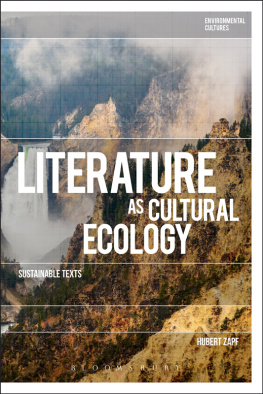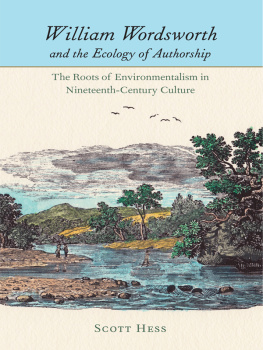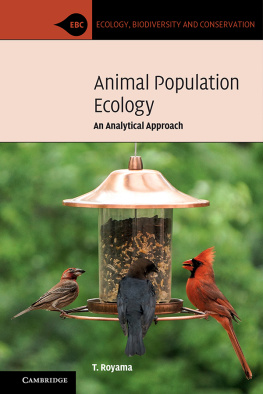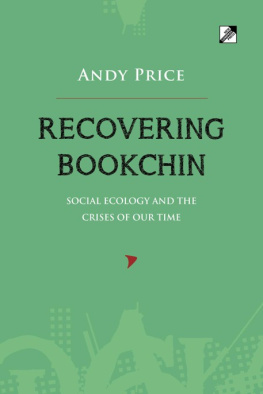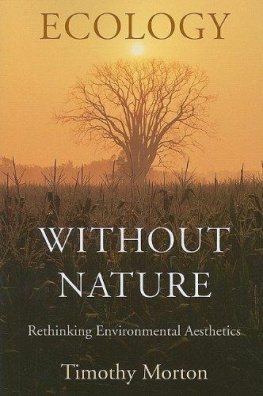ROOTS OF ECOLOGY
Roots of Ecology

ANTIQUITY TO HAECKEL
FRANK N. EGERTON

University of California Press, one of the most distinguished university presses in the United States, enriches lives around the world by advancing scholarship in the humanities, social sciences, and natural sciences. Its activities are supported by the UC Press Foundation and by philanthropic contributions from individuals and institutions. For more information, visit www.ucpress.edu .
University of California Press
Berkeley and Los Angeles, California
University of California Press, Ltd.
London, England
2012 by The Regents of the University of California
Library of Congress Cataloging-in-Publication Data
Egerton, Frank N.
Roots of ecology: antiquity to Haeckel / Frank N. Egerton.
p. cm.
Includes bibliographical references and index.
ISBN 978-0-520-27174-6 (cloth: alk. paper)
1. EcologyHistory. I. Title.
QH540.8.E34 2012
19 18 17 16 15 14 13 12 10 9 8 7 6 5 4 3 2 1
The paper used in this publication meets the minimum requirements of ANSI/NISO Z39.48-1992 (R 1997) (Permanence of Paper).
Cover illustration: Chimborazo, Ecuador, from Views of Nature, c. 1850. Baxters patent oil color print, after Alexander von Humboldt. Photo by Liana J. Cooper, The Journal Times.
Dedicated to scholars who helped both personally and in their publications:
Richard G. Beidleman,
Liliane Bodson,
Jean-Marc Drouin,
Anne-Marie Drouin-Hans,
and
Sidney A. Ewing.
CONTENTS

ACKNOWLEDGMENTS

My entire career has been preparation for writing this book, and my debts of gratitude extend beyond those named here. When I entered Duke University in 1954, no undergraduate course was taught in ecology. Yet I managed to take a zoology course under H. T. Odum and a botany course under Dwight Billings. Physiology was taught to undergraduates. I studied animal physiology under Kunt Schmidt-Nielsen and plant physiology under Paul Kramer. Joe Bailey taught memorable courses in ornithology and vertebrate zoology, with weekend fieldtrips. After graduating, I attended North Carolina State University in Raleigh to study animal ecology with Thomas Quay and plant ecology with Art Cooper. They taught me, among other things, that I was not a scientist, and I transferred to the University of Wisconsin-Madison and earned a PhD in history of science, with a dissertation written under Robert Stauffer on history of the study of animal populations from ancient Greeks to Charles Darwin.
I began writing parts of a longer version of this history in 2000, which appeared quarterly in the Bulletin of the Ecological Society of America, beginning in January 2001. I have had the pleasure of working with two Bulletin editors, Allen M. Solomon (20013) and Edward A. Johnson (2004ongoing), and I thank again scholars whom I acknowledged in the Bulletin not renamed here. I thank historian of ecology Dr. Jean-Marc Drouin, Musum National de Histoire Naturelle, Paris, and Dr. Anne-Marie Drouin-Hans, Universit de Bourgogne, for closely reading my entire manuscript. , including providing me with the illustration of Haeckel and Miklucho.
Finally, I thank my beloved wife, Andrea, for her assistance in a thousand ways.
INTRODUCTION

Ernst Haeckel coined and defined the term oecologie in 1866, and four sciencesplant ecology, animal ecology, limnology, and marine biologyemerged during the 1890s. So why write on the history of ecological sciences beginning in antiquity? A rose by any other name is still a rose. Greeks established the balance-of-nature concept, zoology, and botany; and a Roman invented a catch-all ecological sciencenatural history. These sciences included what we call ecological observations and comments. In the mid-1700s, Carl Linnaeus formally organized an ecological science, oeconomia naturae. His was a static ecology based on static species. What Haeckel did in 1866 was to inject Darwinian dynamism into Linnaeuss concept, though Haeckel left it to others to work out most details. This book is entitled Roots of Ecology: Antiquity to Haeckel because it encompasses natural history and prehistory of plant ecology, animal ecology, limnology, marine biology, Darwinian natural selection, parasitology, entomology, plant physiology, and phytopathology, which are ecological sciences, even if their practitioners did not think of themselves as ecologists. (Gerald Esch calls himself an ecological parasitologist, which distinguishes him from parasitologists who lack that self-concept.) This is a history of scientific endeavors concerning facts, things, and processes that we now study in various ecological sciences. Some of this knowledge was included in different disciplines from time to time.
One reader of my manuscript raised a concern about the danger of writing Whiggish history, looking at the past guided by present concerns, rather than taking the past on its own terms. Readers who never majored in history in college may be unfamiliar with the concept of Whiggish history, but most historians are familiar with Englishman Herbert Butterfields The Whig Interpretation of History (1931), which he wrote to counteract the tendency in many historians to write on the side of Protestants and Whigsto praise revolutions provided they have been successful, to emphasize certain principles of progress in the past, and to produce a story that is the ratification if not the glorification of the present. This is a legitimate concern that I do not dismiss, but there is always the danger of throwing the baby out with the bathwater.
A good example is my article, Changing Concepts of the Balance of Nature,which Butterfield warned against, was meant to undermine modern confidence in the balance of nature. Ecologist John Kircher was able to write The Balance of Nature: Ecologys Enduring Myth (Princeton University Press, 2009) because my article provided a coherent foundation upon which to build.
Could Donald Worsters Natures Economy: The Roots of Ecology (1977) be Whiggish history? Despite my own criticisms of the book in a review (on other grounds than Whiggishness), the book has never gone out of print, and the so-called second edition (1994) is merely the same book with one or two additional chapters added. Its popularity is attributable to its telling a well-written historical story. Many books written by professional historians of biology (Worster being an environmental historian) are analytical within a non-Whiggish context, which is interesting to other historians of biology, but not often to ecologists, and such books often do not stay in print.
A fear of Whiggishness possibly inhibits historians of science from writing histories of particular sciences from antiquity to modern times, though I suspect most historians of science specialize in one period of time and are wary of extending their investigations into other periods. A rare exception is Karl E. Rothschuhs
Next page

